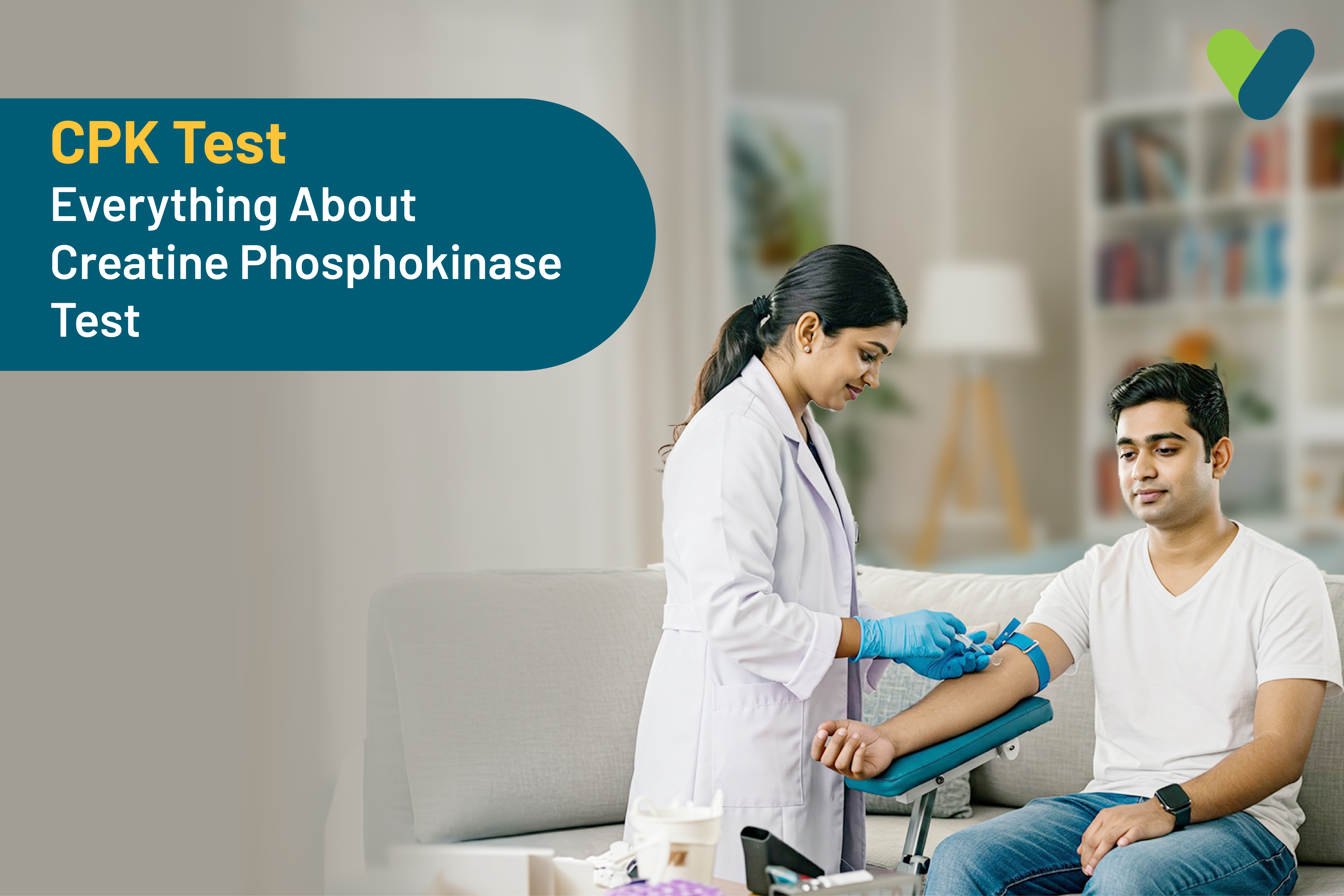What Is CPK Test?
Creatine phosphokinase (CPK) is responsible for the phosphorylation of creatine. This enzyme plays a pivotal role in muscle function. The CPK blood test is a type of test that measures the levels of this enzyme in your blood. Creatine phosphokinase (CPK) can also be called phosphocreatine kinase or creatine kinase (CK). CPK can be broken down into three distinct parts.- CPK-1 is commonly found in your brain and lungs
- CPK-2 is present in your heart
- CPK-3 is primarily found in skeletal muscle

The cost of the CPK test is Rs. 400 to Rs. 900 depending on your location and place.
Please check the price of the CPK blood test in Delhi/NCR, your nearby centers and other details.
Creatine Phosphokinase Blood Test Summary
CPK blood test full form Creatine phosphokinase test| Also known as | Phosphocreatine kinase, creatine kinase (CK).
|
| Test Type | Blood |
| ALT test includes | Which area of your body is damaged |
| Preparation | Doesn’t demand any special preparation |
| Reporting | Within 24 hrs |
| Test price | The cost of the CPK test is Rs. 400 to Rs. 900 depending on your location and place. |
| Also included in | Health Insurance Plans |
| Related tests | CBC, alanine aminotransferase (ALT), Aspartate aminotransferase (AST) |
What Is CPK Test Done For?
A CPK isoenzymes test is performed in the ICU or emergency rooms especially if you are having a heart attack. Some of the primary CPK test uses for which your doctor may recommend this test,- If you are suffering from a heart attack
- Identify the exact cause of your chest pain
- Check how much heart or muscle tissue has been damaged
- Dermatomyositis (an inflammatory disease that influences the skin and muscles)
- Polymyositis (an inflammatory disease that is responsible for muscle weakness)
- Malignant hyperthermia (an inherited disease that causes muscle contractions)
- Other health issues due to muscle breakdown, such as over-exercising, certain medications, or protracted seizures
Creatine Phosphokinase Test Preparation
Creatine Phosphokinase Test (CPK test) is just like another blood test and thus, it doesn’t demand any fasting or special preparation. If you are consuming any over-the-counter and prescription medications, inform your doctor about the same. CPK levels could be elevated due to some medications. These medications could be,- Medicines that minimize your cholesterol level
- Steroids
- Anesthetics
- Amphotericin B (an antifungal medication)
- Alcohol
- Cocaine
- Forceful exercise
- A recent surgery
- Intramuscular injections like vaccines
- Cardiac catheterization (when a catheter is inserted into a vein in your arm, groin, or neck and threaded to your heart)
Creatine Phosphokinase Test Procedure
- After reaching the nearby lab or a diagnostic center, a healthcare provider will use a topical antiseptic to clean the area of your arm.
- The person will tie an elastic band around your upper arm to identify your vein
- Then, by inserting a needle, he will collect your blood sample into a small vial.
- Once the vial is filled, the healthcare professional will remove the needle and elastic band.
- He will apply a bandage or gauze at the puncture site
- The vial will be sent to a laboratory for a detailed analysis
CPK Test Results Interpretation
When you have creatine phosphokinase high in blood, it indicates that you have muscle damage or stress. As explained earlier, CPK is an enzyme found in the brain, heart, and skeletal muscles. When these tissues are injured or stressed, CPK enzyme leaks into the blood. High CPK in blood test levels can be caused by muscle injuries, heart attacks, strenuous exercise, or certain medicines.Following is a detailed analysis of the various CPK in blood test levels :
CPK-1
CPK-1 is mainly present in your brain and lungs. Elevated CPK-1 levels could imply- A brain injury due to a stroke
- A seizure
- Brain tumor or cancer
- Death of lung tissue
- A pulmonary infarction
CPK-2
CPK-2 is present in your heart. Elevated levels of CPK-2 could be- A heart injury due to an accident
- Heart muscle inflammation due to a virus
- An electrical injury
- A heart attack
CPK-3
CPK-3 is commonly present in your skeletal muscle. CPK-3 levels may increase due to,- Damage from a crush injury
- A sedentary lifestyle for an extended period
- Damaged by illegal drug use
- Muscles are inflamed
- Muscular dystrophy
- Seizures
- Muscle trauma
